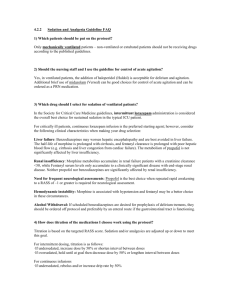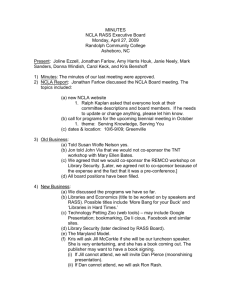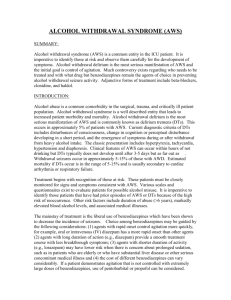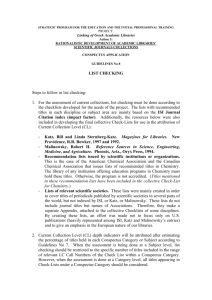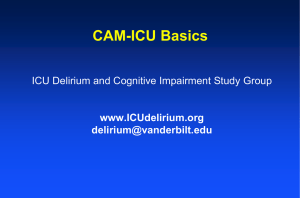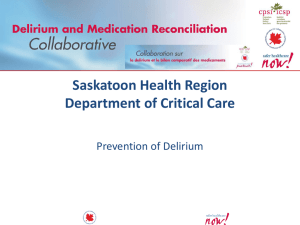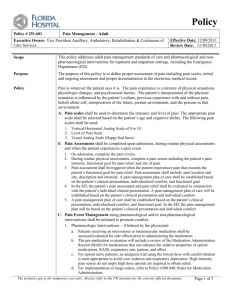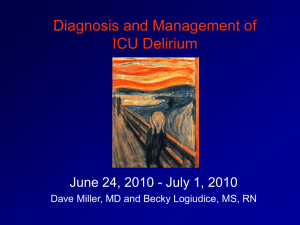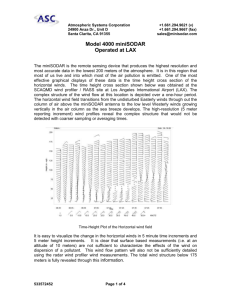RASS Annual Business Meeting & Reception
advertisement
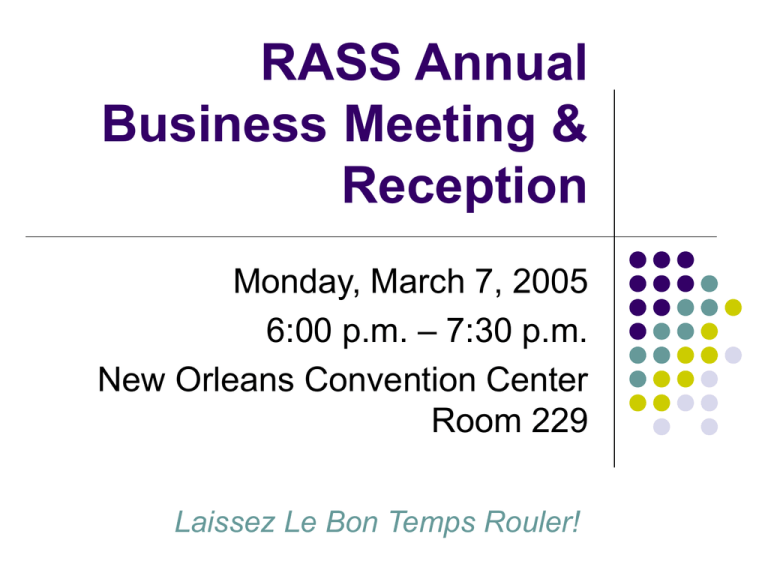
RASS Annual Business Meeting & Reception Monday, March 7, 2005 6:00 p.m. – 7:30 p.m. New Orleans Convention Center Room 229 Laissez Le Bon Temps Rouler! Agenda Accomplishments for 2004-2005 (A. Jarabek) Status of RASS Introduction of new officers RASS Best Abstract Award (M. Gargas) RASS Best Student Abstract Award (M. Gargas) RASS Best Manuscript Awards (K. Krishnan) Advancing Risk Assessment Demonstrating Risk Assessment Application Web page revisions and logo contest (D. Proctor) Next Year: Programs and Activities (K. Krishnan) Open Session for Membership Input Ideas to better serve RASS membership 2004 nomination of symposia workshops, continuing education, etc. Concluding comments by Incoming President (K. Krishnan) Panel Discussion: Dose-dependent Transitions in Mechanisms of Toxicity Status of RASS: 2005 Annual Meeting How many members belong: 384 (↑ of 100) Budget (December 2004): $11,645 Members registered to attend meeting as of March 1: ?? Additional revenue: $4,900 (estimate) Annual meeting expenditure: $2000 (estimate) Sponsored CE Courses: 6 Sponsored Symposia: 6 Secondary endorsements: 26 Precedent set with historical highlight: Vinyl Chloride RASS 2004-2005 Accomplishments Emphasize the role of specialty sections Monthly Telecon Series – the State of our Science November: NAS report on use of human studies December: Dose-response assessment: Past & Present Rory Conolly, CIIT Centers for Health Research January: Dose-response assessment: Future Rory Conolly and Rusty Thomas, CIIT CHR February: HESI Panel on Dose-dependent transition Coming yet this Spring: April 13: Bruce Hope, OR DEP on bioterrorism risk assessment May 11: Michael Liebman, Windber Institute: Discovery and Data mining in health care June 8: Woodrow Setzer, US EPA, NHEERL: OP modeling Special thanks to Merck for generous offer of telecon system RASS 2004-2005 Accomplishments Updated RASS home page Student membership and SAC liaison User friendly Information sharing Event broadcasting Logo contest Letter soliciting student volunteer sent out Student to be determined ASAP for 2006 Consider a Contemporary Concepts in Toxicology (CCT) workshop RASS 2005 CCT Workshop Probabilistic Risk Assessment (PRA) — Bridging Components Along the Exposure-Dose-Response Continuum July 25 ─ 27, 2005 Omni Shoreham Hotel Washington DC Deadline for poster submission is May 12, 2005 For more information visit www.toxicology.org 2005-2006 RASS Officers President Vice President Vice President-Elect Secretary/Treasurer Councilor (2 year) Councilor (1 year) Past President Kannan Krishnan Mike Gargas Jennifer Orme-Zavaleta Lynne Haber Teresa Leavens Deborah Proctor Annie Jarabek Outgoing Officers to Whom We Owe Many Thanks… Councilor Secretary/Treasurer Past President Lorenz Rhomberg Steve DiZio Ed Sargent Other Grande Gratitude to Jeanne Galbo CIIT Centers for Health Research RASS Best Abstract Competition 276 Abstracts with keyword “risk assessment” reviewed by chair of committee 137 Vetted by Awards Committee Scored based on criteria: Originality Quality / Clarity Relevance to the risk assessor No vote for member with conflict of interest on any abstract RASS 2005 Best Abstract Awards Committee Mike Gargas, The Sapphire Group, Inc. (Chair) John Christopher, Cal EPA Michael Dourson, TERA, Inc. Annie Jarabek, CIIT CHR / US EPA RASS 2005 Best Abstract “Top Ten” Blue Ribbon Winners 377. A Framework/Approach for Incorporating PBPK Modeling into Cumulative Risk Assessment of Chemical Mixtures. R. Yang; J. Dennison; J. Lipscomb 381. Risk Assessment in Nephrotoxicology Sensitivity of Renal Tests. P. Potnis; A. Maier; T. Guidotti 402. Incorporation of Trichloroacetic Acid Plasma Binding in Human and Mouse in Trichloroethylene Risk Assessment. D. Keys; M. Lumpkin; J. Bruckner; J. Fisher 404. Monte Carlo Analysis of Sources of Variability in Chloroform-induced Hepatic Cytolethality and Regenerative Proliferation in B6c3f1 Mice. Y. Tan; R. Conolly 349. An integrated QSAR-PBPK model for simulating pharmacokinetics of chemicals in mixtures. K. Price; K. Krishnan 847. A Harmonized PBPK Model for Trichloroethylene Risk Assessment. T. Covington; H. Clewell; J. Fisher; D. Keys; C. Hack; J. Zhao RASS 2005 Best Abstract “Top Ten” Blue Ribbon Winners 866. Validation of a Human Physiologically-Based Pharmacokinetic Model for Vinyl Acetate Against Human Nasal Dosimetry Data. P. Hinderliter; K. Thrall; R. Corley; L. Bloemen; B. Matthew 1096. Assessment of neurotoxicity using zebrafish as a model organism. N. Roy; C. Ton; Y. Lin; C. Parng 1304. A Mechanistic Model of Lifetime Cancer Risk for Inhalation Exposures to Reactive Gases. J. Kimbell; D. Kalisak; R. Conolly; F. Miller; A. Jarabek 1934. Evaluation of Systemic Toxicity in Mixtures of Trichloroethylene (TCE), Heptachlor (HEPT), and Di(2-ethylhexyl)phthalate (DEHP) Assessed in a 5x5x5 Design. J. Simmons; S. Yeatts; J. Zhao; C. Gennings; A. McDonald; R. MacPhail 2110. Improved Dosimetric Adjustment Factors for Interspecies Extrapolation of Inhaled, Poorly Soluble Particles. B. Asgharian; O. Price; A. Jarabek; F. Miller RASS 2005 Best Abstract Award Winner Abstract 2110. (Thursday March 10) Improved Dosimetric Adjustment Factors for Interspecies Extrapolation of Inhaled, Poorly Soluble Particles. B. Asgharian, O. Price, A.M. Jarabek and F.J. Miller. CIIT Centers for Health Research RASS 2005 Best Student Abstract Competition Submission process Student submits abstract and extended abstract (up to 5 pages) Advisor provides letter of recommendation Review process – vetted by Award Committee based on criteria: Originality Clarity Role of Student Special thanks to Taylor and Francis Burdock Group, Inc. RASS 2005 Best Student Abstract Nominees 62. Decreased Acetaminophen and Bromobenzene-induced Hepatotoxicity and Lethality in Type 2 Diabetic Mice. M. Mitra; S. Sawant; A. Dnyanmote; J. Latendresse; A. Warbritton; H. Mehendale, University of Louisiana. 197. Rat Kidney injury molecule-1 (rKim-1) ELISA: A sensitive assay for early detection of kidney tubular injury in preclinical toxicity studies. V. Vaidya; T. Ichimura; J. Bonventre , Harvard Medical School, Brigham and Women’s Hospital. 259. PBPK modeling of inter-child differences in pharmacokinetics on the basis of subjectspecific data on hepatic CYP2E1 levels. A. Nong; D. McCarver; R. Hines; K. Krishnan, University of Montreal. 731. Role of Toxicokinetics in the Bioactivation-mediated Liver Injury of Thioacetamide in Ad Libitum Fed and Diet Restricted Rats. J. Chilakapati; M. Korrapati; H. Mehendale, University of Louisiana. 2095. Characterization of Deltamethrin (Dlt) Metabolism in Adult Male Sprague-dawley Rats. S. Anand; W. Haines; J. Bruckner; J. Fisher; S. Muralidhara; D. Hunter; S. Padilla, University of Georgia. RASS 2005 Best Student Abstract Award Committee Mike Gargas, The Sapphire Group, Inc. (Chair) Lisa Sweeney, The Sapphire Group, Inc. Jim McDougal, Wright State University James Holder, US EPA NCEA RASS 2005 Best Student Abstract Winner Abstract 197. Rat Kidney injury molecule-1 (rKim-1) ELISA: A sensitive assay for early detection of kidney tubular injury in preclinical toxicity studies. V. Vaidya, T. Ichimura, and J. Bonventre Harvard Medical School, Brigham and Women’s Hospital. RASS Annual Best Manuscript Competition Nominations by membership Review of relevant journals published in past year Chosen by Vice-President & Awards Committee Toxicological Sciences Toxicology & Applied Pharmacology Human & Ecological Risk Assessment Regulatory Toxicology & Pharmacology Risk Analysis “Top ten” fully vetted Scoring criteria: merit, clarity, and impact No vote on manuscript for committee member if any conflict of interest RASS 2005 Award Best Manuscript Advancing Risk Assessment Science Awards Committee Kannan Krishnan, Univ. Montreal (Chair) Mel Andersen, CIIT CHR Marcy Banton, Lyondell Mike Gargas, The Sapphire Group, Inc. Annie Jarabek, CIIT CHR / US EPA William Slikker, NCTR 2005 RASS “Top Ten” Papers ADVANCING SCIENCE OF RISK ASSESSMENT 1. 2. 3. 4. 5. Ashani Y and Pistinner S. (2004). Estimation of the upper limit of human butrylchloinesterase dose required for protection against organophosphates toxicity: a mathematically based toxicokinetic model. Toxicological Sciences 77: 358-367. Conolly RB and Lutz WK. (2004). Nonmonotonic dose response relationships: mechanics basis, kinetic modeling and implications for risk assessment. Toxicological Sciences 77: 153-157. Dorne JL, Walton K, Renwick AG. (2004). Human variability in the renal elimination of foreign compounds and renal excretion-related uncertainty factors for risk assessment. Food Chem. Toxicol. 42(23): 275-98. Englehardt JD (2004) Predictive Bayesian dose-response assessment for appraising absolute health risk from available information. Human and Ecological Risk Assessment 10: 69-78. Gaylor DW and Aylward LL. (2004). An evaluation of benchmark dose methodology for noncancer continuous data health effects in animals due to exposed to dioxin. Regulatory Toxicology and Pharmacology 40: 9-17. 2005 RASS “Top Ten” Papers ADVANCING SCIENCE OF RISK ASSESSMENT 6. 7. 8. 9. 10. Gaylor DW, Lutz WK and Conolly RB. (2004). Statistical analysis of nonmonotonic dose-response relationships: research design and analysis of nasal cell proliferation in rats exposed to formaldehyde. Toxicological Sciences 77: 158-164. Toyoshiba H, Yamanaka T, Sone H, Parham FM, Walker NJ, Martinez J, Portier CJ. (2004). Gene interaction network suggests dioxin induces a significant linkage between aryl hydrocarbon receptor and retinoic acid receptor beta. Environ. Health Perspect. 112(12): 1217-24. Razzaghi M and Kodell R. (2004) Quantitative risk assessment for developmental neurotoxic effects. Risk Analysis 24: 1673. Clark LH, Setzer RW and Barton HA. (2004) Framework for evaluation of physiologically-based pharmacokinetic models for use in safety or risk assessment. Risk Analysis 24: 1697. Calabrese EJ (2004). Hormesis: from marginalization to mainstream: a case for hormesis as the defaul dose-response model in risk assessment. Toxicol. Appl. Pharmacol. 197: 125-136. Risk Assessment Specialty Section 2005 Best Paper Advancing the Science of Risk Assessment Toyoshiba H, Yamanaka T, Sone H, Parham FM, Walker NJ, Martinez J, Portier CJ. (2004). Gene interaction network suggests dioxin induces a significant linkage between aryl hydrocarbon receptor and retinoic acid receptor beta. Environ. Health Perspect. 112(12): 121724. RASS 2005 Award Best manuscript demonstrating application of risk assessment Awards Committee Kannan Krishnan, Univ. Montreal (Chair) Steve DiZio, Cal EPA Lynne Haber, TERA Deborah Proctor, Exponent Resha Putzrath, EPA Forum Ed Sargent, Merck 2005 RASS “Top Ten” Papers APPLICATION OF RISK ASSESSMENT 1. Babich MA, Chen SB, Greene MA, Kiss CT, Porter WK, Smith TP, Wind ML, Zamula WW. (2004). Risk assessment of oral exposure to diisononyl phthalate from children’s products. Regul. Toxicol. Pharmacol. 40(2): 151-67. 2. Booze TF, Reinhardt TE, Quiring SJ and Ottmar RD. (2004). A screening level assessment of the health risks of chronic smoke exposure for wildland firefighters. Journal of Occupational and Environmental Hygiene 1: 296-305. 3. Conolly RB, Kimbell JS, Janszen D, Schlosser PM, Kalisak D, Preston J and Miller FJ. (2004). Human respiratory tract cancer risks of inhaled formaldehyde: dose response predictions from biologically-motivated computational modeling of as combined rodent and human dataset. Toxicological Sciences 82: 279-296. 4. Farrrow S. (2004). Using risk assessment, benefit-cost analysis, and real options to implement a precautionary principle. Risk Anal. 24(3): 727-35. 5. Himmelstein MW, Carpenter SC, Evans MV, Hinderliter PM, Kenyon EM. (2004). Kinetic modeling of beta-chloroprene metabolism: II. The application of physiologically based modeling for cancer dose response analysis. Toxicol. Sci. 79(1): 28-37. 2005 RASS “Top Ten” Papers APPLICATION OF RISK ASSESSMENT 6. 7. 8. 9. 10. Kirman CR,, Sweeney LM, Teta MJ, Sielken RL, Valdez-Flores C, Albertini RJ and Gargas ML. (2004). Addressing nonlinearity in the exposure-response relationship for a genotoxic carcinogen: cancer potency estimates for ethylene oxide. Risk Analysis 24: 1165. Renwick AG. (2004). Establishing the upper end of the range of adequate and safe intakes for amino acids: a toxicologist’s viewpoint. J. Nutr. 134(6 Suppl): 1617S-1624S. Schoen A, Beck B, Sharma R and Dubé E. (2004) Arsenic toxicity at low doses: epidemiological and model of action considerations. Toxicology and Applied Pharmacology 198: 253-267. Sweeney LM, Andersen ME and Gargas ML. (2004). Ethyl acrylate risk assessment with a hybrid computational fluid dynamics and physiologicallybased nasal dosimetry model. Toxicological Sciences 79: 394-403. Tsuji JS, Benson Rj, Schoof RA, Hook GC. (2004). Health effect levels for risk assessment of childhood exposure to arsenic. Regul. Toxicol. Pharmacol. 39(2): 99-110. Risk Assessment Specialty Section 2005 Best Paper Demonstrating the Application of Risk Assessment Kirman CR,, Sweeney LM, Teta MJ, Sielken RL, ValdezFlores C, Albertini RJ and Gargas ML. (2004). Addressing nonlinearity in the exposure-response relationship for a genotoxic carcinogen: cancer potency estimates for ethylene oxide. Risk Analysis 24: 1165. RASS Web Page Update RASS Description, Goals and Activities Links Monthly Telecons Dates and Downloads History of RASS Current and Previous Officers and all Presidents Annual Meeting Best Abstract Awards Best Student Abstracts RASS Endorsed Symposia, etc. RASS Web Page Update (continued) Links Annual Meeting Best Manuscript Awards from 2004 and 2005 Upcoming Events Information regarding reception Information regarding Panel Discussion Tonight CCT on Probabilistic Risk Assessment Links to other sites and meetings of interest Just Getting Started Seeking Your Input Logo Contest History of RASS Feedback on Web Page Pictures Graphics Send to DProctor@Exponent.com Logo Contest First Entry Logo Contest Second Entry Logo Contest Third Entry Logo Contest Extended for 1 week after SOT (3/17/05) Email Your Entries to Deb Proctor (Dproctor@Exponent.com) Computer and drawing skills are not required Prepares will be Anonymous RASS Membership will vote by email Winner by End of March Proof that Ability to Draw is Not a Requirement RASS 2005/06 Program & Activities Submission of symposia and continuing education proposals Need your input & ideas Evaluate venue attributes that best suit topic: Provide endorsements: Symposium Workshop Continuing Education Four primary endorsements Help fully develop proposals Follow-up Contemporary Concepts in Toxicology (CCT) program PRA proposal Program development and funding formula RASS 2005/06 Program & Activities (cont.) Post-doc and graduate student memberships in RASS Risk assessment programs Institutional contacts Enrolment RASS Newsletter Bi-monthly, electronic Update on activities, hot issues, announcements, opportunities, … Membership participation Teleconference presentations Risk assessment tools Topics TBD by YOU — please let us know! RASS 2005 Reception Conclusion Open Forum Panel Discussion: Dose-dependent transitions in mechanisms of toxicity William Slikker, US FDA NCTR Ray David, Eastman Kodak Rory Conolly, CIIT Centers for Health Research Dale Hattis, Clark University William Farland, US EPA ORD David Jacobson-Kram, US FDA CDER
